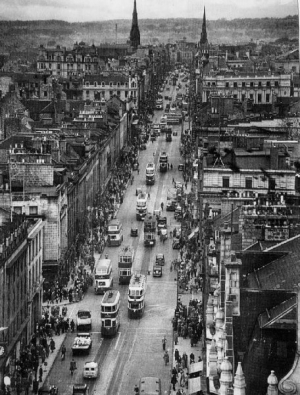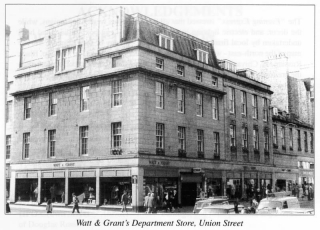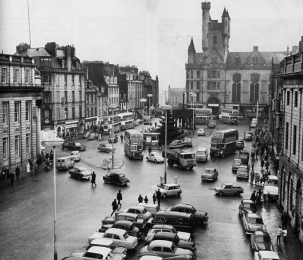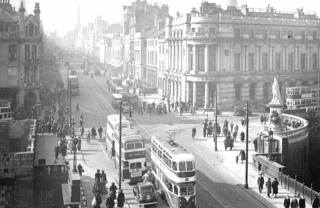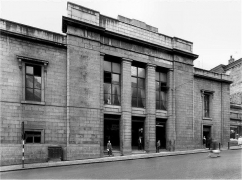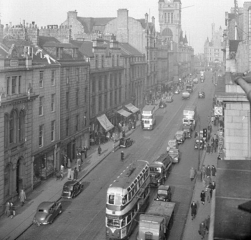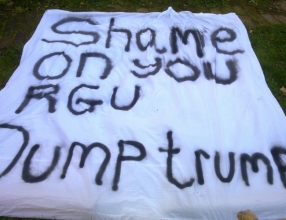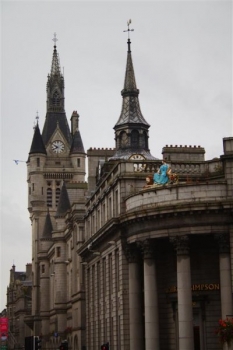Old Susannah has been constantly on the go the past week. Here’s her travelogue…
On Friday I attended most of the public hearing on the Loirston Loch proposal at the Town House. Admittedly, I left before the full meeting ended, so missing Kate Dean’s concluding remarks, but I would have lost the will to live altogether, and I had to be at Peacock for 6pm.
Sorry I only lasted 8 hours at the hearing, but seeing as Kate was doing a great job of being impartial as convener, I left, in the knowledge that the stadium was in safe hands. See the article elsewhere in this edition of Voice.
Next day, the P&J printed an article favouring the stadium development which ignored all the practical problems and local objections, alongside a piece on Cove Rangers being allowed to move to new premises. Of course, these two developments in the Aberdeen footballing world are completely unrelated. Old Susannah must have wandered into a completely different public hearing from the one the P&J wrote about, as I missed the parts that proved how this stadium will not only make us all rich, but also make us the envy of the northern hemisphere. I came away with the subtle feeling that one or two of the residents might not be onside with putting a 21,000 seat stadium on their greenbelt.
The Peacock exhibition features Alicia Bruce’s photographic portraits of the residents facing potential eviction through compulsory purchase, so that Mr Trump can have the world’s most kitsch – sorry – most excellent, perfect, wonderful, swell, expensive golf course. A review and photos of the exhibition is elsewhere in Voice.
Finally, George Galloway and his moustache are in the news this week. He seems to be saying he will end his political career in Scotland. Has no one told him that his political career well and truly ended when he was on Big Brother pretending to be Rula Lenska’s cat? Respect….?
..and she shares the week’s defining moments in her Dictionary, Part 21
Embezzle
(Verb) To embezzle is to appropriate goods, property or money fraudulently when in a position of power, rather like when we pay Council Tax to local government with the false promise we’ll get something of value in return. Now it looks as if a City Council employee has been taking his work home with him literally – to the tune of somewhere between £300,000 and £400,000. It is understood the person and his wife are now ‘helping police with their enquiries’.
there is no fraud to worry about really, except the odd half million pound case like this one
Yes, it’s hard to understand how our well-run, efficient, properly audited and controlled City could have allowed such a thing to happen; ‘financial impropriety’ and ‘Aberdeen City Council’ are words you’d never expect to hear in the same sentence, I know.
Stringent controls are in place to prevent, for instance, property being sold below market value, property being sold to private developers when the City thinks it is really selling property to the NHS, or building work contract values escalating out of control, and the like. In fact there are ‘Investigation Managers’ and ‘Budget Analysts’ on the City’s efficient payroll.
But relax – there is no fraud to worry about really, except the odd half million pound case like this one, which clearly is a one-off and will never happen again.
Incandescent (Adjective) Incandescent is the ‘condition of glowing or emitting heat and light’. Indeed, it is often associated with lightbulbs but presumably less so with the new mercury-filled ones which don’t give out quite enough light for my taste. John Major famously took the word ‘incandescent’ and coupled it with his anger, coming up with the phrase, ‘not inconsiderably incandescent with rage’ to describe how he usually felt. This may have been his greatest contribution as Prime Minister, although we might want to ask Mrs Edwina Currie her opinion.
This adjective is still being used by the brightest stars in the political firmament, as no less a luminary than our own Kate Dean has told the press she is incandescent. No, not just her natural glow of warmth, charm and beauty; she is incandescent with anger.
Who’s upset Kate? The Scottish Government transport authorities have had the gall to criticise Aberdeen’s public transport management – the nerve!
outsiders might mistakenly think we have problems. I hope that an apology to Kate is on the way
As if there was anything to criticise. Kate’s main problem is that she didn’t have a chance to defend the City’s sterling record on public transport. The frequent bus services, the low prices, the potholes, the bus lanes.Apparently we’ve created one million pounds worth of bus lanes recently, part of the reason traffic moves so swiftly.
The well thought-out transport arrangements for Union Square and the bus and railway stations are greatly appreciated by people with mobility problems as well as car drivers and bus passengers, who, in rush hour or late night shopping days, can spend ages window-shopping at Union Square from the comfort of their own cars. Building the new AFC stadium is going to add 80 buses at current estimate and 1400 cars to the mix on Wellington Road, pollution levels on which can be higher than national recommended levels, but with the new bus lanes, well, it will be fine.
Part of Ms Dean’s problem is that Aberdeen wasn’t invited to the particular meeting where the criticism was levelled, so she could not defend our excellent system. Clearly a system as perfect as ours would not be able to stand on its own merits for others to marvel at – outsiders might mistakenly think we have problems. I hope that an apology to Kate is on the way.
Joined-up government.
How do things in the public sector work so well?
How do our governors manage to accomplish so much good with our tax money so efficiently?
The answer is that we have ‘joined-up government’.
The term ‘joined-up government’ is defined as ‘a method of governing wherein all departments and branches communicate efficiently with each other and act together purposefully and effectively towards well-defined objectives – but you don’t need me to tell you that’s what you’ve got in the ‘deen.
It is little wonder that international property developers want to come here when they see how ‘joined up’ we are.
It’s hard to pick out just one example pertaining to our government in terms of its ‘joined-up’ thinking, so I’ll take the most recent one. In the P&J on 19 January, there’s a story of how Scottish Enterprise and Aberdeen City Council work in harmony to our benefit.
Peacock Art Gallery, you may recall, had managed to secure a large grant from the Arts Council to build new premises. Like vultures smelling blood, the City and Scottish Enterprise moved in to offer assistance. They assisted Peacock right out of its plans for the Union Terrace Gardens arts centre it had proposed.
But what becomes of the grant from the Arts Council? It’s now probably lost forever, and we have the amusing spectacle of Aberdeen City v Scottish Enterprise. The blame game is on. Who did what and when is being argued over in the press as these two entities try to blame each other for the loss. Strangely enough, many years back, the Arts Council had ring-fenced a few million for an arts centre in the Castlegate. This money too was lost forever. A deadline approached, and the City Council seems not to have known anything about it, despite having a Council representative attending the relevant meetings. It is little wonder that international property developers want to come here when they see how ‘joined up’ we are. They know when they see examples like the latest drama over Peacock funding unfold, that we are people to be reckoned with – smart, astute business minds working in conjunction. There is no way we will be fooled or taken advantage of when great minds are in control. Not here.
On a serious note
Spare a thought for Sandy Ingram, the 79 year-old man found severely beaten in June of last year. He will now need full-time care, and can never return to the home he knew. Apparently he had seen two men on his property before he was assaulted. Whilst the residents in his area of Newmachar are now more vigilant regarding strangers, and are reporting suspicious behaviour to police, it comes too late for the Ingram family.
Someone out there knows what happened to him which is still a mystery to the rest of us. If you don’t come forward you are as guilty as if you’d hurt this elderly man yourself. And the next time someone else gets permanently injured or worse, you’ll have to live knowing you could have prevented it.
Even if you just suspect something, make an anonymous call. Do the right thing.

